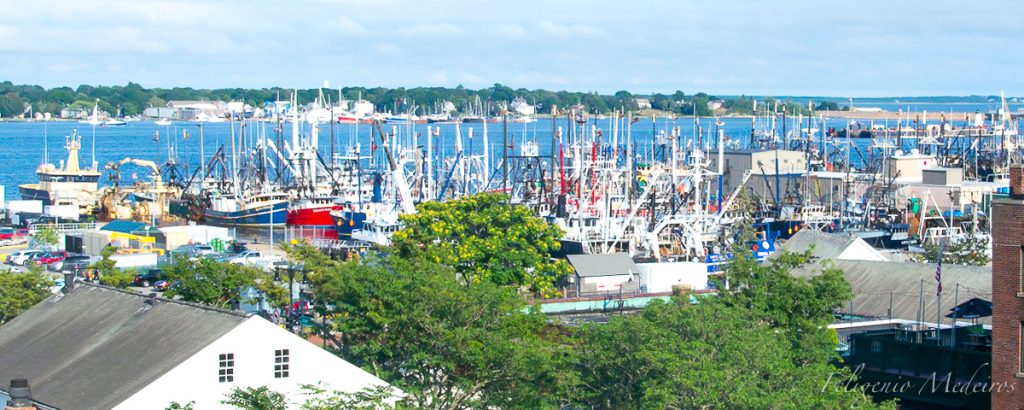New Bedford, United States, 03 Aug 2019 (Lusa) – Portuguese and Portuguese descendants are “pivotal” in the activity of the largest commercial fishing port in the United States of America, the mayor of New Bedford said, Jonathan Mitchell, in an interview with Lusa
A coastal city 90 kilometers south of Boston, with a population of 100,000, of which almost 40 percent is of Portuguese blood, New Bedford has the largest commercial fishing port in the United States, with direct access to the Atlantic Ocean.
According to the Port Authority, direct sales amount to 61,000 tonnes of fish annually, valued at $322 million dollars (EUR 290 million).
With more than 6,800 direct workers and more than 40,000 workers in related businesses, the economic activities related to the port of New Bedford produce more than 11.1 billion dollars (almost EUR 10 billion).
The city’s mayor, Jonathan Mitchell, attributes the maritime commercial success to the knowledge and know-how of various immigrant groups, of which the Portuguese, and in particular Azoreans, stand out.
Immigrants from Portugal and all Lusodescendants living in the city “have been instrumental in making New Bedford the primary fishing port in America,” the mayor argued.
“One of the main reasons why we have been so successful is the contribution of the Portuguese community,” Mitchell said in an interview with Lusa, describing the city that has welcomed Portuguese immigrants for 150 years.
While not sharing certain data about the nationalities of New Bedford-based maritime business members, the mayor considered the Portuguese to be “probably the largest ethnicity of the fishing fleet” of what is the largest US commercial port.
New Bedford’s fishing activity has increased significantly in recent years, according to the mayor, who explained that decreasing fish numbers in the waters caused several smaller ports to close and vessels to move to New Bedford.
“In many places, there are ports that have been closed or reduced as a result of less fish and many vessels from these places are coming to New Bedford. We are experiencing a significant increase, ”Jonathan Mitchell explained to Lusa.
Beyond the harbor, New Bedford lives a lot of Portuguese culture and cuisine, which can be seen in museums of Madeiran and Azorean heritage, restaurants serving typical Portuguese food, and Portuguese events and feasts.
“Our Portuguese community,” added the Mayor, “has been contributing for 150 years in countless ways. (…) Portuguese people are in all social strata in our city, in leading positions in both politics and business. ”
The Lusodescendant community brings authenticity to New Bedford, the mayor said.
“We live in America where there is so much sameness; the same kind of freeways and secondary roads that lead to the same cities, homes, and shopping centers that can be found anywhere in the United States, ”said the mayor.
“New Bedford is very different, very authentic, and a major element of this authenticity is the Portuguese heritage,” concluded Jonathan Mitchell.
Azorean fishermen constituted the first wave of Portuguese immigration in the city of New Bedford from the 1870s.
In the nineteenth century, New Bedford was a world center for the whaling industry, to which Azorean immigrants contributed greatly.
- Fadista Sara Correia Performs at 2023 Lowell Folk Festival
- An Evening of Fado with Maria Emília and Helder Moutinho in Lowell, MA
- Fado Museum, in Lisbon, inaugurates “Celeste” exhibition, a tribute to fado singer Celesta Rodrigues (1923-2018)
- INTERVIEW: “Ice Merchants” Producer Needs Funding for Final Step Toward the Oscars
- Portuguese communities in North America reject SATA’s “abusive” prices
Now in the twentieth century, the whaling industry began to disappear, but commercial fishing began to have more concentration, driven by Portuguese, Irish and Norwegian immigrants.
The second wave of Portuguese immigration in New Bedford came when the textile industry was flourishing in the 1920s when 70 cotton factories employed over 41,000 workers.
Portuguese immigration to New Bedford still had a third phase in the 1960s.
Locals also know that in the years 1957 and 1958 there was a large volcanic eruption in the Azores that forced a large number of Portuguese refugees to travel to the US, aided by Congressional legislation.
Jonathan Mitchell said that after the volcanic eruption in the archipelago, a new immigration wave began that lasted until the 1980s and this “brought new life to New Bedford, especially from the Azores.”
Ver artigo em Português
Portugueses são fundamentais no maior porto comercial dos EUA – autarca de New Bedford
New Bedford, Estados Unidos, 03 ago 2019 (Lusa) – Os portugueses e lusodescendentes são “fundamentais” na atividade do maior porto de pesca comercial dos Estados Unidos da América, declarou, em entrevista à Lusa, o autarca da cidade de New Bedford, Jonathan Mitchell.
Cidade costeira situada 90 quilómetros a sul de Boston, com uma população de 100 mil habitantes, da qual quase 40% é de sangue português, New Bedford detém o maior porto de pesca comercial dos Estados Unidos, com acesso direto ao oceano Atlântico.
Segundo a Autoridade Portuária, as vendas diretas ascendem, anualmente, a 61.000 toneladas de peixe, no valor de 322 milhões de dólares (290 milhões de euros).
Com mais de 6.800 trabalhadores diretos e mais de 40.000 trabalhadores em negócios derivados, as atividades económicas relacionadas com o porto de New Bedford produzem mais de 11.100 milhões de dólares (quase 10.000 milhões de euros).
Jonathan Mitchell, ‘mayor’ da cidade, atribui o sucesso comercial marítimo ao conhecimento e ‘know-how’ de vários grupos imigrantes, dos quais os portugueses – e em particular açorianos – se destacam.
Os imigrantes provenientes de Portugal e todos os lusodescendentes que vivem na cidade “têm sido fundamentais em tornar New Bedford no porto de pesca primário na América”, defendeu o autarca.
“Uma das principais razões por que temos sido tão bem-sucedidos é o contributo da comunidade portuguesa”, disse Mitchell em entrevista à Lusa, descrevendo a cidade que acolhe imigrantes portugueses há 150 anos.
Apesar de não partilhar dados certos quanto às nacionalidades dos membros dos negócios marítimos sediados em New Bedford, o ‘mayor’ considerou que os portugueses são “provavelmente a maior etnicidade da frota de pesca” daquele que é o maior porto comercial dos EUA.
A atividade piscatória de New Bedford tem aumentado significativamente em anos recentes, segundo o ‘mayor’, que explicou que a diminuição da quantidade de peixe nas águas provoca o encerramento de vários portos menores e a mudança de embarcações para New Bedford.
“Em muitos lugares há portos que têm sido encerrados ou reduzidos como resultado de menos peixe e muitas embarcações desses lugares estão a vir para New Bedford. Estamos a viver um aumento significativo”, explicou Jonathan Mitchell à Lusa.
Para além do porto, New Bedford vive de muita cultura e gastronomia portuguesa, o que se pode verificar em museus de património madeirense e açoriano, restaurantes de comida típica portuguesa ou eventos e festas.
“A nossa comunidade portuguesa”, acrescentou o governante, “tem contribuído há 150 anos de inúmeras maneiras. (…) As gentes portuguesas estão em todas as camadas sociais na nossa cidade, em posições de liderança tanto na política como no negócio”.
A comunidade de lusodescendentes traz autenticidade a New Bedford, garantiu o ‘mayor’.
“Vivemos na América onde há tanta mesmice; o mesmo tipo de autoestradas e ramais de acesso que levam às mesmas cidades, casas e centros comerciais que se podem encontrar em qualquer lado nos Estados Unidos”, descreveu o autarca.
“New Bedford é muito diferente, muito autêntica, e um grande elemento dessa autenticidade é a herança portuguesa”, concluiu Jonathan Mitchell.
Os pescadores açorianos constituíram a primeira vaga da imigração portuguesa na cidade de New Bedford a partir dos anos 1870.
No século XIX, New Bedford era um centro mundial da indústria baleeira (caça à baleia), para o qual os imigrantes açorianos contribuíram muito.
Ver outros artigos no Feel Portugal
- Fadista Sara Correia Performs at 2023 Lowell Folk Festival
- An Evening of Fado with Maria Emília and Helder Moutinho in Lowell, MA
- Fado Museum, in Lisbon, inaugurates “Celeste” exhibition, a tribute to fado singer Celesta Rodrigues (1923-2018)
- INTERVIEW: “Ice Merchants” Producer Needs Funding for Final Step Toward the Oscars
- Portuguese communities in North America reject SATA’s “abusive” prices
Já no século XX, a indústria baleeira começou a desaparecer, mas a pesca comercial passou a ter mais concentração, movida pelos imigrantes portugueses, irlandeses e noruegueses.
A segunda vaga da imigração portuguesa em New Bedford deu-se quando a indústria têxtil estava a florescer, nos anos 1920, numa altura em que 70 fábricas de algodão empregavam mais de 41.000 trabalhadores.
A imigração portuguesa em New Bedford teve ainda uma terceira fase nos anos 1960.
Os habitantes locais também sabem que nos anos 1957 e 1958 deu-se uma grande erupção vulcânica nos Açores que obrigou a viagem de um grande número de refugiados portugueses aos EUA, auxiliada por legislação do Congresso americano.
Jonathan Mitchell disse que depois da erupção vulcânica no arquipélago, começou uma nova vaga de imigração que se estendeu até aos anos 1980 e isso “trouxe nova vida a New Bedford, especialmente dos Açores”.
EYL // EL
Lusa/Fim



1 Comment
My grandparents migrated from San Miguel & Madeira. They settled in Maui, Hawaii.
I’m thrilled to learn more about Portuguese in New Bedford & traditions they kept. I now live in Cumming , GA & hope we can visit this area in a couple of years.
Anxious to receive newsletter & new posts by email.